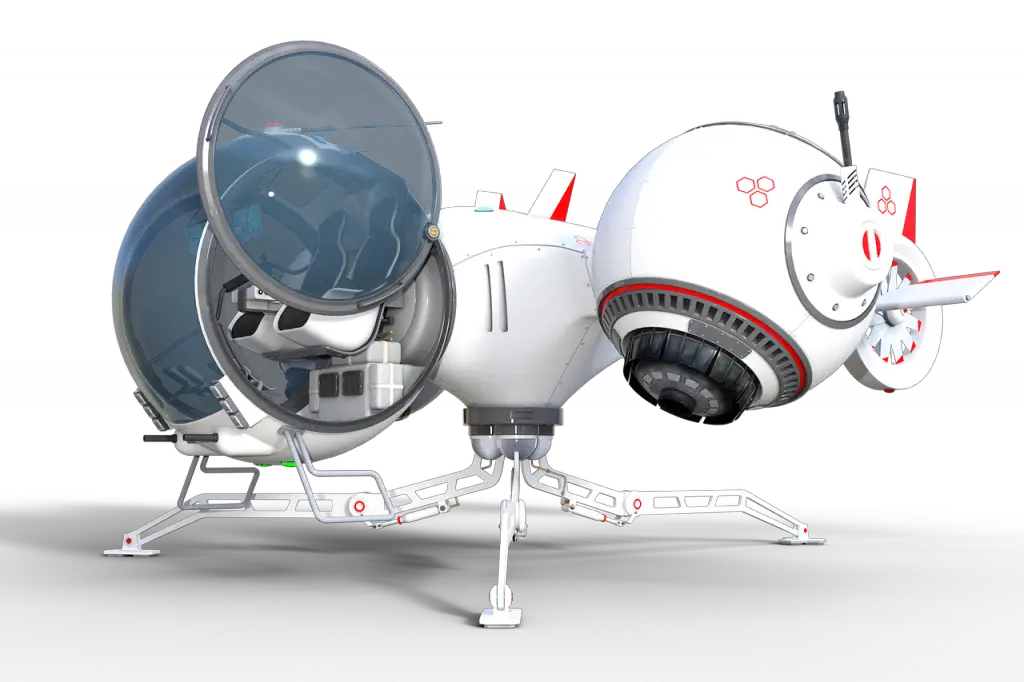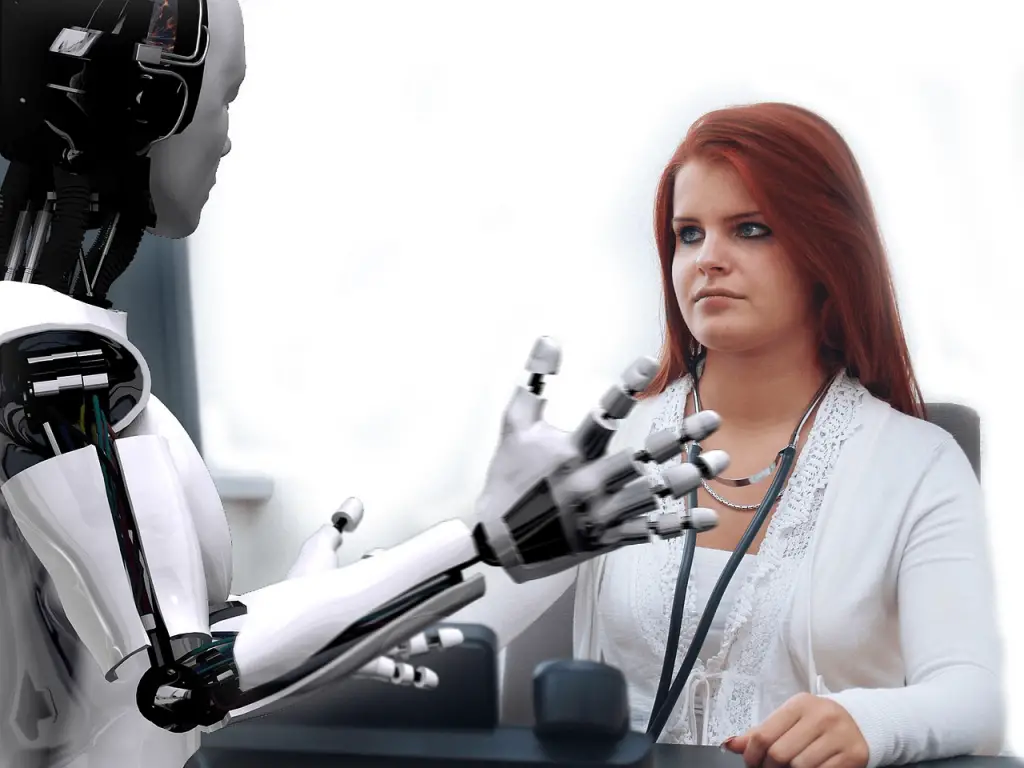Curious about what are the academic degrees that didn’t exist 10 years ago? Here are the 15+ most interesting ones that are meaningful and rewarding.
Are you ready to explore fascinating and lucrative fields that have emerged in our rapidly evolving world? In this blog post, we’ll dive into cutting-edge domains that hold the keys to unlocking vast wealth and success.
Discover how to turn your passion for the undiscovered into a prosperous and fulfilling career by venturing into these groundbreaking fields.
We’ve reviewed US Bureau of Labor Statistics data and academic fields that didn’t exist 10 years ago but can be meaningful and rewarding today
Table of Contents
Crypto/Mining/Metaverse
#1. Virtual Reality (VR) and Augmented Reality (AR)

Virtual Reality and Augmented Reality are two key components of the rapidly-growing Metaverse.
While VR immerses users in a completely virtual environment, AR overlays digital content onto the real world. Both technologies have found applications in gaming, education, healthcare, and many other industries.
Where can you study these programs?
Many universities and online platforms offer courses and degrees in VR and AR. Some popular options include:
- MIT’s Virtual Reality and Augmented Reality course
An 8-week course that covers the foundations of VR and AR. The course is taught by MIT’s experts and offers a certificate at the end.
- Coursera’s Virtual Reality Specialization
These courses cover a range of topics including design, development, and programming. The specialization is made up of a series of courses and can be completed for free or for a fee.
Who are the pioneers in this field?
- Palmer Luckey
Palmer Luckey is the founder of Oculus VR, a company that has revolutionized the virtual reality industry. Luckey’s most notable achievement is the development of the Oculus Rift, a groundbreaking VR headset that brought high-quality, immersive virtual reality experiences to consumers.
In 2014, Facebook acquired Oculus VR for $2 billion, recognizing the potential of VR technology in gaming, social networking, education, and other applications.
- Jaron Lanier
Jaron Lanier is a computer scientist, composer, and author who has been a pioneer in the field of virtual reality since the 1980s. He is credited with coining the term “virtual reality” and has been instrumental in the development of VR technologies.
Lanier founded VPL Research, the first company to sell VR products, including the DataGlove and the EyePhone. His work has laid the foundation for many of the VR technologies we see today, and he continues to be an influential figure in the industry.
#2. Blockchain Technology

Blockchain technology is the backbone of cryptocurrencies like Bitcoin and Ethereum. It is a decentralized, distributed ledger that records transactions in a secure and transparent manner. Blockchain has the potential to revolutionize industries such as finance, supply chain, and even voting systems.
Where can you study this program?
Numerous universities and online platforms offer courses on blockchain technology and cryptocurrencies. Here are the popular options:
- UC Berkeley
At UC Berkeley, you can take a course on blockchain technology and cryptocurrencies. The course covers the fundamentals of blockchain, cryptocurrencies, and decentralized networks.
Students will also learn about how Bitcoin works, how to use Ethereum for smart contracts and DApps development, how to build your own cryptocurrency from scratch, and more.
- Coursera’s Blockchain Specialization
Coursera offers a comprehensive overview of the blockchain space. It includes courses on blockchain technology, Bitcoin and other cryptocurrencies, smart contracts, token sales, cryptography, and privacy-enhancing technologies (PETs), as well as the legal implications of blockchain.
The specialization is designed for learners who want to gain expertise in the field of cryptocurrencies
Who are the pioneers in this field?
- Satoshi Nakamoto
Satoshi Nakamoto is the pseudonymous creator of Bitcoin, the world’s first cryptocurrency. Nakamoto’s groundbreaking 2008 whitepaper, “Bitcoin: A Peer-to-Peer Electronic Cash System,” introduced the concept of a decentralized, digital currency that relies on a peer-to-peer network and blockchain technology to securely record transactions.
Bitcoin’s success has spurred the development of thousands of other cryptocurrencies and has paved the way for the widespread adoption of blockchain technology in various industries.
- Vitalik Buterin
Vitalik Buterin is a programmer and co-founder of Ethereum, the second-largest cryptocurrency by market capitalization. Ethereum introduced the concept of “smart contracts,” which are self-executing contracts with the terms of the agreement directly written into code.
This innovation has opened up new possibilities for decentralized applications (dApps) and has led to the rise of decentralized finance (DeFi) and non-fungible tokens (NFTs). Buterin’s work on Ethereum has significantly impacted the blockchain and cryptocurrency landscape.
Artificial Intelligence
#3. Computer Vision

Computer Vision is a subfield of Artificial Intelligence (AI) that focuses on enabling computers to interpret and understand visual information from the world. It has applications in autonomous vehicles, facial recognition, and medical imaging, among others.
Where can you study this program?
Several top universities and platforms offer courses and degrees in computer vision and AI. Popular options include:
- Stanford University’s CS231n: Convolutional Neural Networks for Visual Recognition
- Coursera’s Deep Learning Specialization
Who are the pioneers in this field?
- Yann LeCun
Yann LeCun is a computer scientist known for his groundbreaking work in the field of computer vision. LeCun’s most significant achievement is the development of the convolutional neural network (CNN) architecture, which has become a cornerstone of modern computer vision and image recognition systems.
CNNs have been used in facial recognition, autonomous vehicles, and medical imaging. In recognition of his contributions to AI and computer vision, LeCun was awarded the Turing Award in 2018, often referred to as the “Nobel Prize of Computing.”
- Fei-Fei Li
Fei-Fei Li is a leading AI researcher known for her work on ImageNet, a large-scale visual recognition dataset that has significantly advanced the field of computer vision.
ImageNet consists of millions of labeled images, which have been used to train deep-learning models for object recognition and classification. Li’s work on ImageNet has contributed to the rapid progress in computer vision and has influenced the development of numerous AI applications.
AI Prompt Engineering
#4. AI Image Design

AI Image Design refers to the use of AI algorithms and techniques to create, edit, and enhance images. This field has seen rapid advancements with the development of Generative Adversarial Networks (GANs) and other deep learning models that can generate realistic images from scratch.
Where can you study this program?
Online platforms and universities offer courses and degrees in AI and deep learning. This knowledge can be applied to AI Image Design. These programs include:
- Coursera’s Deep Learning Specialization
- Fast.ai’s Practical Deep Learning for Coders
Who are the pioneers in this field?
- Ian Goodfellow
A researcher who introduced the concept of Generative Adversarial Networks (GANs), which have become a key technology in AI Image Design.
- Alexei Efros
A computer scientist known for his work on image synthesis and editing techniques, such as image inpainting and style transfer.
#5. AI Video Generation

AI Video Generation involves the creation and manipulation of video content using AI techniques. Advances in the field of computer vision have led to remarkable progress, with machines now able to generate realistic videos, perform video synthesis, and even manipulate existing videos.
Applications of AI video generation include video editing, visual effects, and deepfake detection.
Where can you study this program?
Courses and degrees in AI, deep learning, and computer vision can provide the foundation for AI Video Generation. Popular options include:
- Stanford University’s CS231n: Convolutional Neural Networks for Visual Recognition
- Coursera’s Deep Learning Specialization
Who are the pioneers in this field?
- Iain Matthews
A researcher known for his work on facial animation and video manipulation techniques, such as facial reenactment and expression transfer.
- Phillip Isola
A computer scientist who has contributed to the development of video synthesis algorithms, including those used for generating realistic videos from textual descriptions.
#6. AI Chatbot Design

AI Chatbot Design focuses on the development of intelligent conversational agents that can interact with users in a natural and engaging manner. These chatbots can be used for customer support, virtual assistants, and even entertainment.
AI Chatbot Design involves natural language processing (NLP), natural language understanding (NLU), and natural language generation (NLG) techniques to enable human-like conversations.
Where can you study this program?
Many universities and online platforms offer courses and degrees in AI, NLP, and machine learning, which can be applied to AI Chatbot Design. Options include:
- Stanford University’s CS224n: Natural Language Processing with Deep Learning
- Coursera’s Natural Language Processing Specialization
Who are the pioneers in this field?
- Yoshua Bengio:
A renowned AI researcher who has made significant contributions to the development of neural networks for natural language processing and understanding.
- Richard Socher
A computer scientist known for his work on deep learning models for NLP and NLU, including the development of the Recursive Neural Tensor Network (RNTN).
Brain-Computer Interfaces Technology
#7. Neural Signal Processing

Neural Signal Processing involves the acquisition, analysis, and interpretation of electrical signals generated by the brain. These signals, such as electroencephalography (EEG) and magnetoencephalography (MEG), can provide insights into neural activity and can be used as input for BCI systems.
Researchers in this field develop algorithms and techniques to process and decode these signals to facilitate communication between the brain and external devices.
Where can you study this program?
Many universities and online platforms offer courses and degrees in neuroscience, biomedical engineering, and signal processing, which can be applied to Neural Signal Processing. Some popular options include:
- MIT’s Introduction to Neural Networks
- Coursera’s Neural Signal Processing course
Who are the pioneers in this field?
- John Donoghue
A neuroscientist known for his work on decoding neural signals for BCI applications, particularly in the development of the BrainGate system.
- Theodore W. Berger
A researcher who has made significant contributions to the field of neural signal processing, including the development of neural prosthetic devices.
#8. Neuroprosthetics

Neuroprosthetics are devices that interface with the nervous system to restore or replace lost motor, sensory, or cognitive functions. These devices help individuals with paralysis, amputations, or neurological disorders regain control of their limbs or communicate with the outside world.
Researchers in this field focus on the design, development, and implementation of neuroprosthetic devices that can be controlled using neural signals.
Where can you study this program?
Courses and degrees in neuroscience, biomedical engineering, and prosthetics can provide a foundation for a career in Neuroprosthetics. Some popular options include:
- Johns Hopkins University’s Neuroprosthetics Course
- Coursera’s Introduction to Biomedical Engineering
Who are the pioneers in this field?
- Miguel Nicolelis
A neuroscientist known for his work on brain-machine interfaces and the development of neuroprosthetic devices for restoring motor function.
- Arto Nurmikko
A researcher who has made significant contributions to the development of wireless neuroprosthetic devices for communication and control.
#9. Invasive and Non-invasive BCI

Invasive and Non-invasive BCI technologies refer to the methods used to interface with the brain.
Invasive BCI involves the implantation of electrodes directly into the brain tissue, providing high-resolution and accurate neural signal recordings. Non-invasive BCI, on the other hand, relies on external sensors placed on the scalp to record neural signals, such as EEG.
Both invasive and non-invasive BCI technologies have their advantages and challenges, and researchers in this field work on improving the performance, safety, and usability of these systems.
Where can you study this program?
Universities and several online platforms offer courses and degrees in neuroscience, biomedical engineering, and BCI technologies. Some popular options include:
- University of Washington’s Neural Engineering course
- Coursera’s Introduction to Brain-Computer Interfaces
Who are pioneers in this field?
- Gerwin Schalk
A researcher known for his work on invasive and non-invasive BCI technologies, including the development of algorithms for decoding neural signals.
- Niels Birbaumer
A pioneer in the field of BCI who has made significant contributions to the development of non-invasive BCI systems for communication and rehabilitation.
Smart Home
Smart home technology is revolutionizing the way we interact with our living spaces, and these kills play a crucial role in enabling seamless voice control and integration of smart devices.
This rapidly evolving field encompasses several subfields, including Voice Recognition and Control, Smart Home Integration, and Conversational AI.
#10. Voice Recognition and Control (E.g., Alexa Skills)

Voice Recognition and Control involves the development of systems that can accurately recognize and process spoken language, allowing users to control devices and perform tasks using voice commands.
This field combines elements of natural language processing, speech recognition, and machine learning to create responsive and intuitive voice-controlled interfaces.
Where can you study this program?
Universities and online platforms offer courses and degrees in natural language processing, speech recognition, and machine learning, which can be applied to Voice Recognition and Control. Some popular options include:
- Stanford University’s CS224S: Spoken
- Language Processing
- Coursera’s Speech Recognition Systems course
Who are the pioneers in this field?
- James K. Baker
A computer scientist known for his work in speech recognition, including the development of the Hidden Markov Model (HMM) approach.
- Alex Waibel
A researcher who has made significant contributions to the field of speech recognition and machine translation, particularly in the development of multilingual speech recognition systems.
#11. Smart Home Integration

Smart Home Integration focuses on the seamless connection and communication between various smart devices within a home, enabling users to control and automate various aspects of their living spaces.
This field involves the development of protocols, standards, and APIs that allow different smart devices to work together, as well as the creation of user-friendly interfaces for managing and controlling these devices.
Where can you study this program?
Courses and degrees in computer science, software engineering, and IoT (Internet of Things) can provide a foundation for a career in Smart Home Integration. Some popular options include:
- MIT’s Internet of Things: Roadmap to a Connected World course
- Coursera’s Introduction to the Internet of Things and Embedded Systems.
Who are the pioneers in this field?
- Tony Fadell
Known as the “father of the iPod,” Fadell is also a co-founder of Nest Labs, which developed the Nest Learning Thermostat and contributed to the growth of smart home technology.
- Colin Angle
A co-founder of iRobot, the company behind the Roomba robotic vacuum cleaner, which has become a staple of smart home automation.
#12. Conversational AI

Conversational AI focuses on the development of intelligent conversational agents that can interact with users in a natural and engaging manner. These agents, such as Alexa, can be used for various purposes, including controlling smart home devices, providing information, and assisting with tasks.
Conversational AI involves natural language processing (NLP), natural language understanding (NLU), and natural language generation (NLG) techniques to enable human-like conversations.
Where can you study this program?
Here are two of the most popular options for this course:
- Stanford University’s CS224n: Natural Language Processing with Deep Learning
- Coursera’s Natural Language Processing Specialization
Who are the pioneers in this field?
- Alan Turing
A pioneer in the field of artificial intelligence, Turing laid the foundation for conversational AI with his famous Turing Test, which assesses a machine’s ability to exhibit human-like conversation.
- Joseph Weizenbaum
A computer scientist who created ELIZA, one of the earliest examples of a conversational AI program, which simulated a psychotherapist.
Interspace Travel
Interspace travel is an exciting frontier that pushes the boundaries of human exploration and technology. As we venture further into the cosmos, several key fields have emerged to support this endeavor. Here are some of them:
#13. Space Communication and Navigation

Space Communication and Navigation involves the development of systems and technologies that enable reliable communication and navigation for spacecraft, satellites, and other space assets.
This field encompasses the design of antennas, transmitters, receivers, and signal processing techniques, as well as the creation of protocols and algorithms for precise positioning and tracking of space vehicles.
Where can you study this program?
Courses and degrees in aerospace engineering, communications engineering, and satellite technology can be applied to Space Communication and Navigation. Some popular options include:
- MIT’s Introduction to Aerospace Engineering: Astronautics and Human Spaceflight
- Coursera’s Satellite Communications: Physical Layer
Who are the pioneers in this field?
- John D. Kraus
An engineer and radio astronomer known for his work on antennas and radio telescopes, including the development of the helical antenna used in many space communication systems.
- Brad Parkinson
Known as the “father of GPS,” Parkinson played a key role in the development of the Global Positioning System, which is crucial for navigation in space and on Earth.
#14. Space Exploration Technologies

Space Exploration Technologies focuses on the development of spacecraft, propulsion systems, and other technologies that enable humans and robots to explore the cosmos.
This field encompasses the design and engineering of launch vehicles, spacecraft systems, robotic explorers, and instruments for scientific research in space.
Where can study this program?
Courses and degrees in aerospace engineering, mechanical engineering, and astronautics can provide a foundation for a career in Space Exploration Technologies. Some popular options include:
- University of Colorado Boulder’s Introduction to Astronautics
- Coursera’s Introduction to Aerospace Engineering: Launching into Space
Who are the pioneers in this field?
- Wernher von Braun
A rocket engineer and space architect who played a pivotal role in the development of the Saturn V rocket, which powered the Apollo missions to the Moon.
- Robert H. Goddard
Known as the “father of modern rocketry,” Goddard made significant contributions to the field of rocket propulsion, including the development of the first liquid-fueled rocket.
#15. In-Situ Resource Utilization

In-Situ Resource Utilization (ISRU) involves the extraction, processing, and utilization of resources found in space to support human and robotic missions. This field aims to reduce the need for launching supplies from Earth, thereby lowering the cost and complexity of space exploration.
ISRU encompasses the development of technologies for mining, processing, and manufacturing using materials found on the Moon, Mars, and other celestial bodies.
Where can you study this program?
Courses and degrees in aerospace engineering, materials science, and planetary science can provide a foundation for a career in In-Situ Resource Utilization. Some popular options include:
- MIT’s Space Systems Engineering course
- Coursera’s Planetary Science and the Search for Life
Who are the pioneers in this field?
- Harrison Schmitt
An Apollo 17 astronaut and geologist, Schmitt has been a strong advocate for lunar resource utilization, particularly the extraction of helium-3 for fusion energy.
- Robert Zubrin
A space advocate and engineer, Zubrin has made significant contributions to the field of ISRU, particularly in the development of the Mars Direct plan, which emphasizes the use of Martian resources to support human missions.
Human-Computer Interaction
#16. User Experience Design

User Experience Design is the process of enhancing user satisfaction by improving the usability, accessibility, and overall experience of a product or interface.
UX Designers work to understand users’ needs, preferences, and behaviors, and use this knowledge to create seamless and enjoyable interactions with technology. These professionals may work with social media managers, app developers, cloud specialists, and many other people to achieve their goals.
Where can you study this program?
Several universities and online platforms offer courses and degrees in HCI, UX Design, and related fields. Here are two of the most popular options:
- Stanford University’s CS147: Introduction to Human-Computer Interaction Design
- Coursera’s Interaction Design Specialization
Who are the pioneers in this field?
- Don Norman
A cognitive scientist and usability engineer, Norman is considered the “father of UX design.” He coined the term “user experience” and has written extensively on the subject, including his influential book, “The Design of Everyday Things.”
- Jakob Nielsen
A usability expert and consultant, Nielsen is known for his work on web usability and his development of the “10 Usability Heuristics for User Interface Design,” which serve as guiding principles for creating user-friendly interfaces.
Others
#17. Robotics Engineering

Robotics Engineering is a multidisciplinary field that focuses on the design, construction, and operation of robots and robotic systems.
This field combines various engineering disciplines, such as mechanical, electrical, and computer engineering, to create intelligent machines capable of performing complex tasks autonomously or semi-autonomously.
Where can you study this program?
Some of the top schools for Robotics Engineering are:
- Carnegie Mellon University (CMU)
- Massachusetts Institute of Technology (MIT)
- Stanford University
- University of California, Berkeley
- University of Michigan
Who are the pioneers in this field?
- Rodney Brooks
An Australian roboticist who believed that robots should take action to help humans.
- Hiroshi Ishiguro
A Japanese roboticist famous for creating lifelike humanoid robots, including his own robotic doppelganger. He is the director of the Intelligent Robotics Laboratory at Osaka University and has contributed significantly to the field of android science.
#18. Cyber Security

Cyber Security is a vital aspect of modern technology that focuses on protecting computer systems, networks, and data from digital attacks, unauthorized access, and damage. It involves the study of various disciplines, including cryptography, network security, risk management, and vulnerability assessment.
Where can you study this program?
Some of the top schools for Cyber Security education include:
- the University of Maryland,
- Massachusetts Institute of Technology (MIT),
- Carnegie Mellon University,
- Stanford University.
Who are the pioneers in the field?
- Bruce Schneier
An internationally renowned security technologist and author, known for his work on cryptography, privacy, and security.
- Whitfield Diffie
Along with Martin Hellman, Diffie developed the groundbreaking Diffie-Hellman key exchange, which laid the foundation for modern encryption and secure communication.
These pioneers have significantly contributed to the advancement of cyber security and have inspired many professionals to explore and innovate in this critical field.
Conclusion
Alongside the fields discussed in this blog post, cloud computing has revolutionized data storage and management, while the competitive video gaming industry has emerged as a major player in the entertainment sector.
The rise of social media platforms has led to the growth of online journalism, allowing for the sharing of more diverse perspectives.
Digital marketing and social media management have become the essential tools for businesses, with social media strategies playing a crucial role in improving a company’s online presence.
Furthermore, the emergence of big data has led to the development of data science, a field dedicated to analyzing and extracting valuable insights from vast amounts of information.
As these fields, as well as the ones mentioned in our post, continue to grow and evolve, cloud architects, and other professionals (or even a social media manager and digital marketing specialist) will undoubtedly shape the future of our increasingly digital world.


